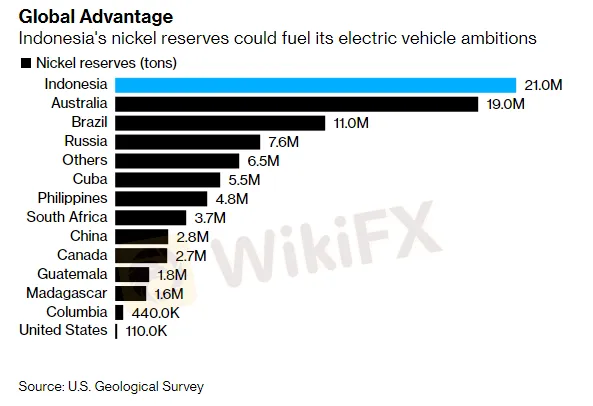简体中文
繁體中文
English
Pусский
日本語
ภาษาไทย
Tiếng Việt
Bahasa Indonesia
Español
हिन्दी
Filippiiniläinen
Français
Deutsch
Português
Türkçe
한국어
العربية
Indonesia Dangles Cheaper Energy to Lure Billions in Investment
Abstract:Indonesia is touting an abundance of low-cost renewable energy to lure billions of dollars in investment Southeast Asia’s largest economy needs to build processing plants for commodities such as nickel, copper and aluminum.
Indonesia is touting an abundance of low-cost renewable energy to lure billions of dollars in investment Southeast Asias largest economy needs to build processing plants for commodities such as nickel, copper and aluminum.
The commodity powerhouse has potential to develop 33,000 megawatts of hydro power and 29,000 megawatts of geothermal energy at costs as low as 2-4 cents per kilowatt, Coordinating Minister for Maritime and Investment Affairs Luhut Pandjaitan said. The green energy will help the country cut its use of fossil fuels and produce more value-added commodities, he said.
China And Malaysia Meetings
Luhut PandjaitanPhotographer: Daisuke Suzuki /Pool/Getty Images
Indonesia, home to some of the world‘s largest deposits of copper, nickel and tin, is curbing exports of raw materials to force companies to build refineries and smelters to create more jobs and boost export earnings. President Joko Widodo has said focusing on local value addition over exports can help wipe out a current-account deficit that’s weighed on the nations currency and bonds.
Indonesia's nickel reserves could fuel its electric vehicle ambitions

“We are rich in natural resources and we‘d like to see more value added” locally, Pandjaitan, who oversees about half a dozen ministries from energy to trade, said in a Bloomberg Television interview from Shanghai on Wednesday. “There is an abundance of energy in Indonesia. We’d like to maximize the use of this energy” to keep Indonesia less polluted as well, he said.
Indonesia has banned nickel-ore exports starting January, two years earlier than previously planned, as the worlds top supplier sought to preserve the commodity for companies planning billions of dollars of investments in building electric vehicle and battery plants. It has also forced companies including Freeport-McMoRan Inc. to commit to build copper smelters to squeeze more out of its mineral riches.
Not Nationalistic
Pandjaitan, who has spearheaded the governments policies in the mineral sector, said the restrictions on raw material exports were not a “nationalistic approach” but meant to generate jobs for the locals and boost the economy.
“Dont misunderstand that we are going to close our country to foreign direct investment,” Pandjaitan said. “Our priority is to get foreign direct investment in Indonesia.”
The move to shun nickel ore exports has had some success in drawing foreign investment into stainless steel, electric batteries and vehicles. Investments into nickel and related industries may reach $30 billion by 2024, Pandjaitan said.
Spending on new nickel processing plants is predicted to total $20 billion by 2024, with projects involving Chinese battery giant Contemporary Amperex Technology Co., miner Vale SA and Sumitomo Metal Mining Co. already advancing. Toyota Motor Corp., Tesla Inc., Volkswagen AG and battery maker LG Chem Ltd. also are scoping out opportunities, the government has said.
Here are the other highlights of the interview:
Indonesia is open to investment from China as long as investors comply with local regulations, use the latest technology, employ local workers, agree to transfer of technology and add value to raw materials
Indonesia is also talking to investors from Japan, the U.S., United Arab Emirates to build and finance various projects
Government has a pipeline of about $150 billion projects, including in the oil and gas, petrochemicals and mining sectors, awaiting investors.
Disclaimer:
The views in this article only represent the author's personal views, and do not constitute investment advice on this platform. This platform does not guarantee the accuracy, completeness and timeliness of the information in the article, and will not be liable for any loss caused by the use of or reliance on the information in the article.
WikiFX Broker
Latest News
Justin Sun Invests $30M in Trump-Backed World Liberty Financial
Kraken Closes NFT Marketplace Amid New Product Focus
Robinhood Launches Ethereum Staking with 100% Rewards Match
Broker Review: Is FOREX.com a solid Broker?
Philippine Banks Launch PHPX Stablecoin to Transform Payments
Elon Musk Warns of Imminent US Bankruptcy | Bitcoin Retreats from $100K
WikiEXPO Global Expert Interview: Advanced Practices and Insights in Financial Regulation
Pros & Cons of Automated Forex Trading
Magic Compass Sponsors World Taekwondo Poomsae Championships 2024
Trump tariffs: President-elect is serious but it\s not about trade
Currency Calculator


